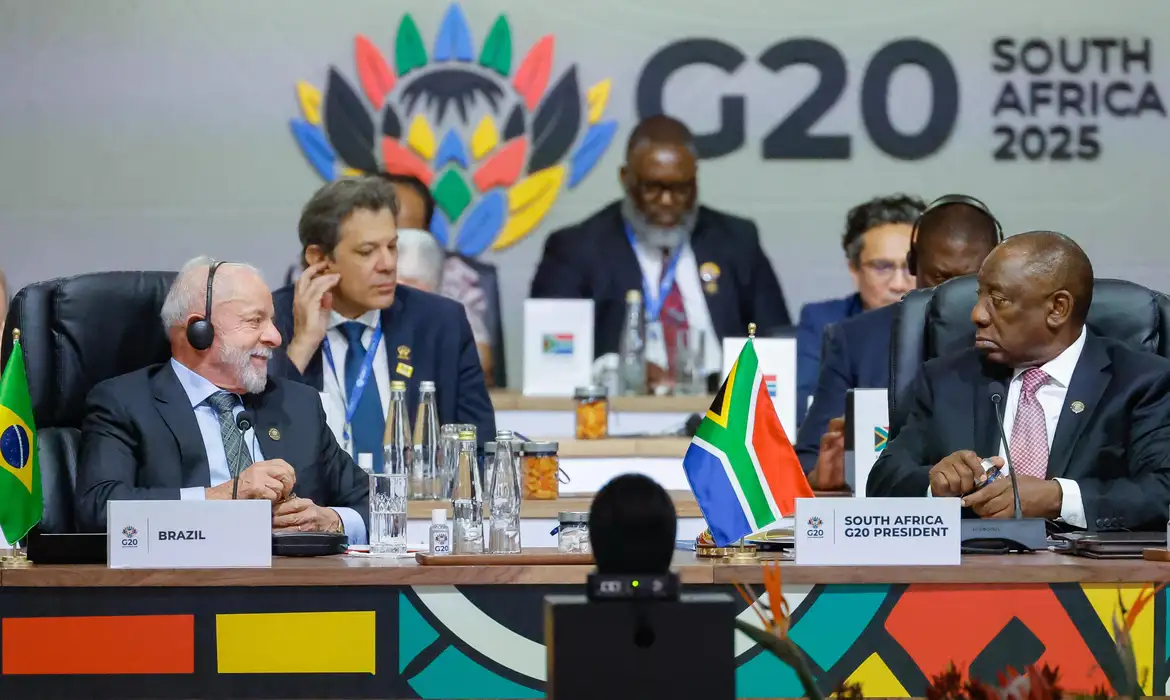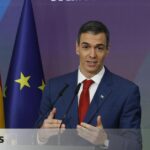
President also highlighted decent work and large platforms
President Luiz Inácio Lula da Silva warned, this Sunday (23), of the need to discuss the sovereignty of countries over the knowledge and added value of critical minerals. Lula spoke during the last thematic session of the G20 Leaders’ Summit – a group of the world’s largest economies, in Johannesburg, South Africa.
On the agenda, critical minerals, artificial intelligence and decent work. Topics that were also present in the discussions at the 30th United Nations Conference on Climate Change (COP30), which ended this weekend, in Belém, Pará (click here and check out EBC’s complete coverage).
“The way we integrate these three vectors of development will define not only our present, but the future of the next generations”, stated the Brazilian president.
Critical minerals are essential resources for strategic sectors, such as technology, defense and energy transition, whose supply is subject to risks of scarcity or dependence on few suppliers. They include elements such as lithium, cobalt, nickel and rare earths, which are key to electric vehicle batteries, wind turbines, solar panels and semiconductors.
This G20 Summit, under the South African presidency, will publish a document on critical minerals that reinforces the idea of benefiting these products in their countries of origin, with the principles that must be observed in the extraction and processing of this raw material.
For Lula, the energy transition offers opportunities to expand technological frontiers and give new meaning to the role of exploring natural resources.
“Countries with a large concentration of mineral reserves cannot be seen as mere suppliers, while remaining on the sidelines of technological innovation. What is at stake is not just who owns these resources, but who controls the knowledge and the added value that they derive from them”, he told the leaders.
“Talking about critical minerals is also talking about sovereignty. Sovereignty is not measured by the amount of natural deposits, but by the ability to transform resources through policies that bring benefits to the population. We need environmentally and socially responsible investments, which contribute to strengthening the industrial and technological base of resource-holding countries”, he stated.
Brazil, for example, has around 10% of the world’s reserves of these elements, according to the Brazilian Mining Institute (Ibram), an entity that represents the private sector.
In the country, research indicates that the search for minerals needed for energy transition projects is already causing conflict on new exploratory fronts. Another study shows that this demand accelerates the climate crisis.
Lula recalled that Brazil created the National Council of Critical and Strategic Minerals to plan mineral exploration policies and stated that the country will not just be an exporter, but a partner in the global value chain of these elements.
AI and decent work
In the same sense, the president argued that artificial intelligence (AI) represents a “unique opportunity” to boost the development of nations in an equitable way. He defends the institution of global and representative governance for the topic, so that its benefits are shared.
“[A IA] it promotes innovation, increases productivity, encourages sustainable practices and can improve people’s lives in concrete ways. The big challenge is not just to master the tool, but to work so that everyone can use it in a safe, secure and reliable way”, he said.
“When few control the algorithms, data and infrastructure linked to economic processes, innovation starts to generate exclusion. It is essential to avoid a new form of colonialism: digital. It is urgent that the largest economies in the world deepen the debate on AI governance and that the United Nations be the center of this discussion”, he added.
Lula also recalled that 2.6 billion people do not have access to the digital world. According to him, in high-income countries 93% of the population has access to the Internet, while in low-income countries this percentage is only 27%.
Finally, the president defended that technological development is linked to job opportunities and worker protection, as 40% of workers in the world are in roles highly exposed to AI, at risk of automation or technological complementation.
“Every solar panel, every chip, every line of code must carry with it the mark of social inclusion,” he said. “We must create bridges between traditional and emerging sectors. Technology must strengthen, not weaken, human and labor rights”, he told the G20 leaders.
Agenda
The G20 is the main body for international economic cooperation, created in 1999 after the Asian financial crisis. In 2008, it also became a political body, with a summit of heads of state and government.
In 2025, South Africa will conduct the work of the G20 under the motto “Solidarity, Equality and Sustainability”, with four priorities: strengthening resilience and capacity to respond to disasters; public debt sustainability in low-income countries; financing for the fair energy transition; and critical minerals as engines of development and economic growth.
The South African presidency also ends a cycle in which all countries will have exercised leadership of the group at least once.
On the sidelines of the summit, this Sunday, Lula also met with the leaders of the India-Brazil-South Africa Dialogue Forum (Ibas). The trilateral initiative was developed in 2003 with the aim of promoting cooperation between countries in the Global South.
Lula arrived in Johannesburg on Friday (21) and, this Saturday (22), spoke at the first two thematic sessions of the G20, on sustainable and inclusive economic growth and climate change and disaster risk reduction.
He also held bilateral meetings with South African President Cyril Ramaphosa and German Prime Minister Friedrich Merz.
Later today, the president will head to Maputo, capital of Mozambique, where he will make a working visit this Monday (24). The trip is part of the celebrations of 50 years of diplomatic relations between the two countries. Lula is expected to return to Brazil on Monday.
Originally published by Agência Brasil on 11/23/2025
By Andreia Verdélio – Brasília
Editing: Juliana Cézar Nunes
Source: https://www.ocafezinho.com/2025/11/23/g20-lula-defende-governanca-soberana-em-minerais-criticos-e-ia/

